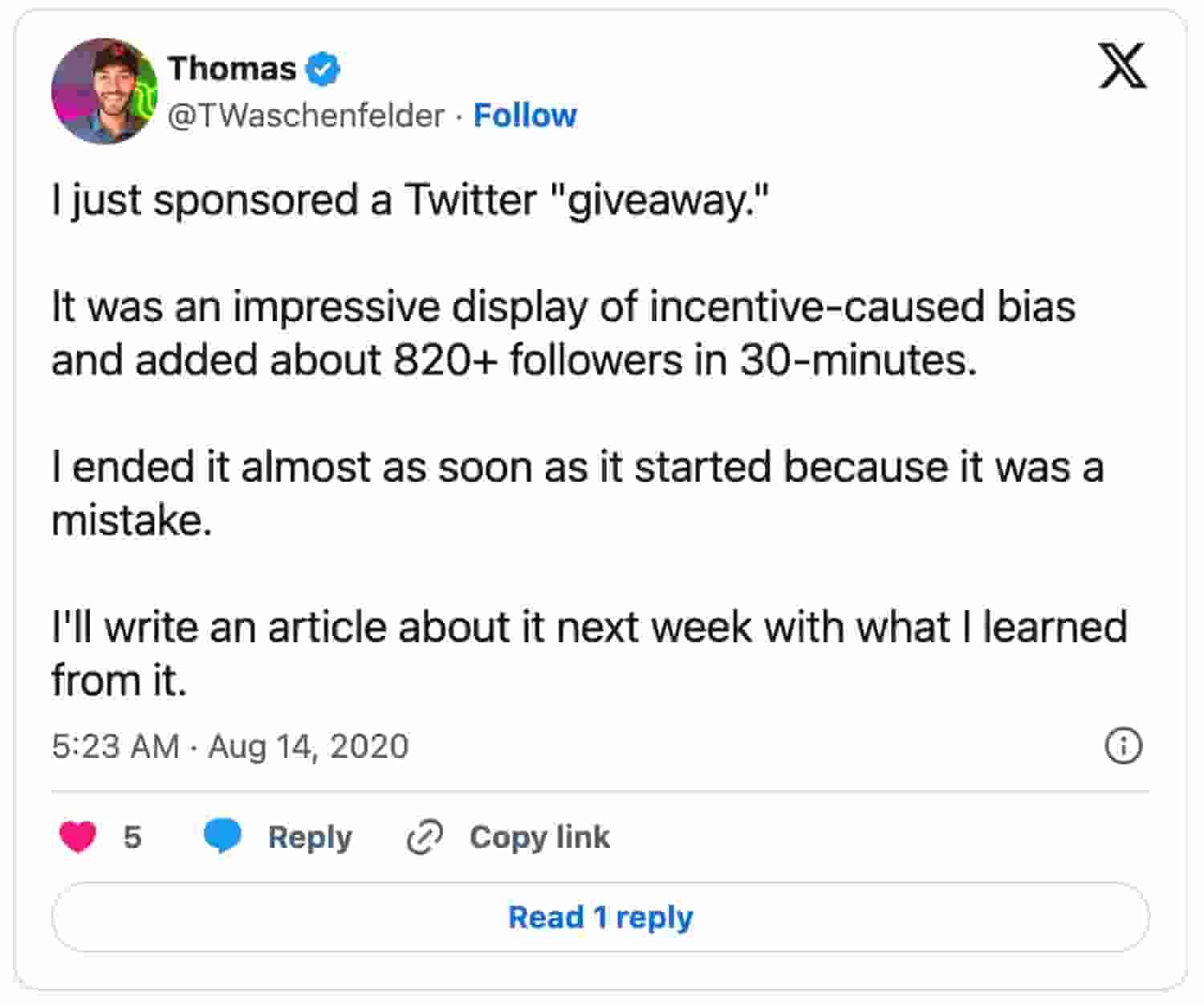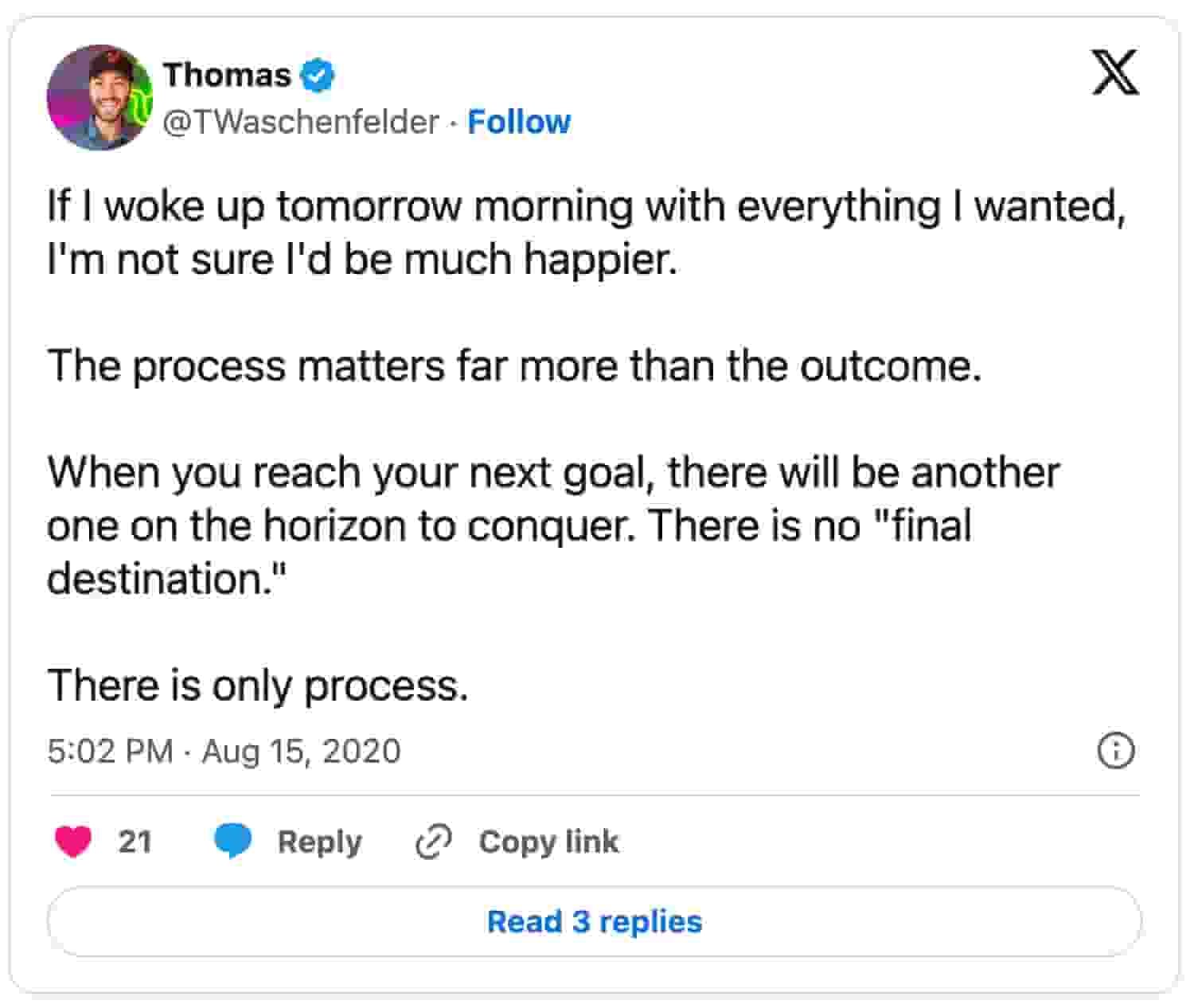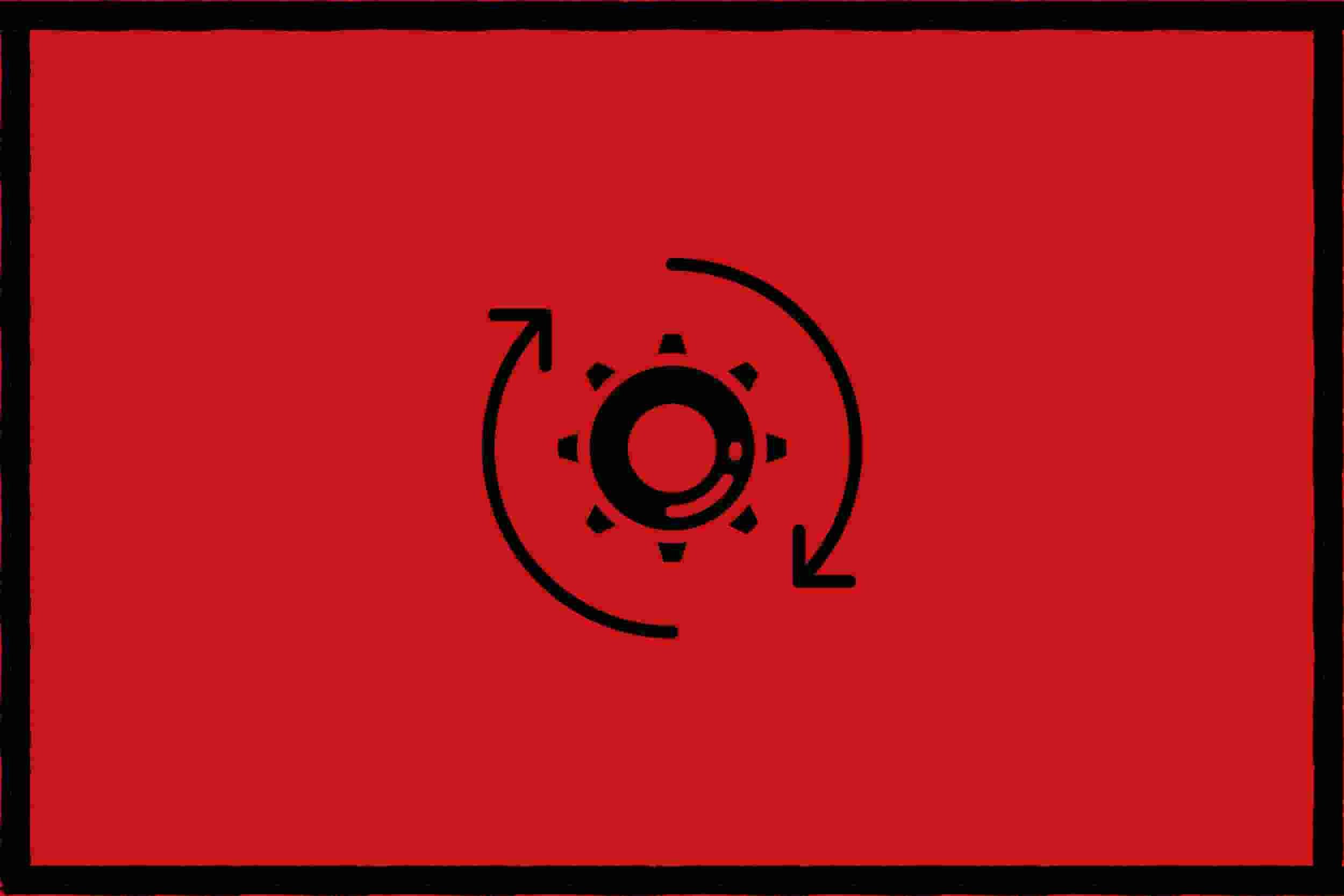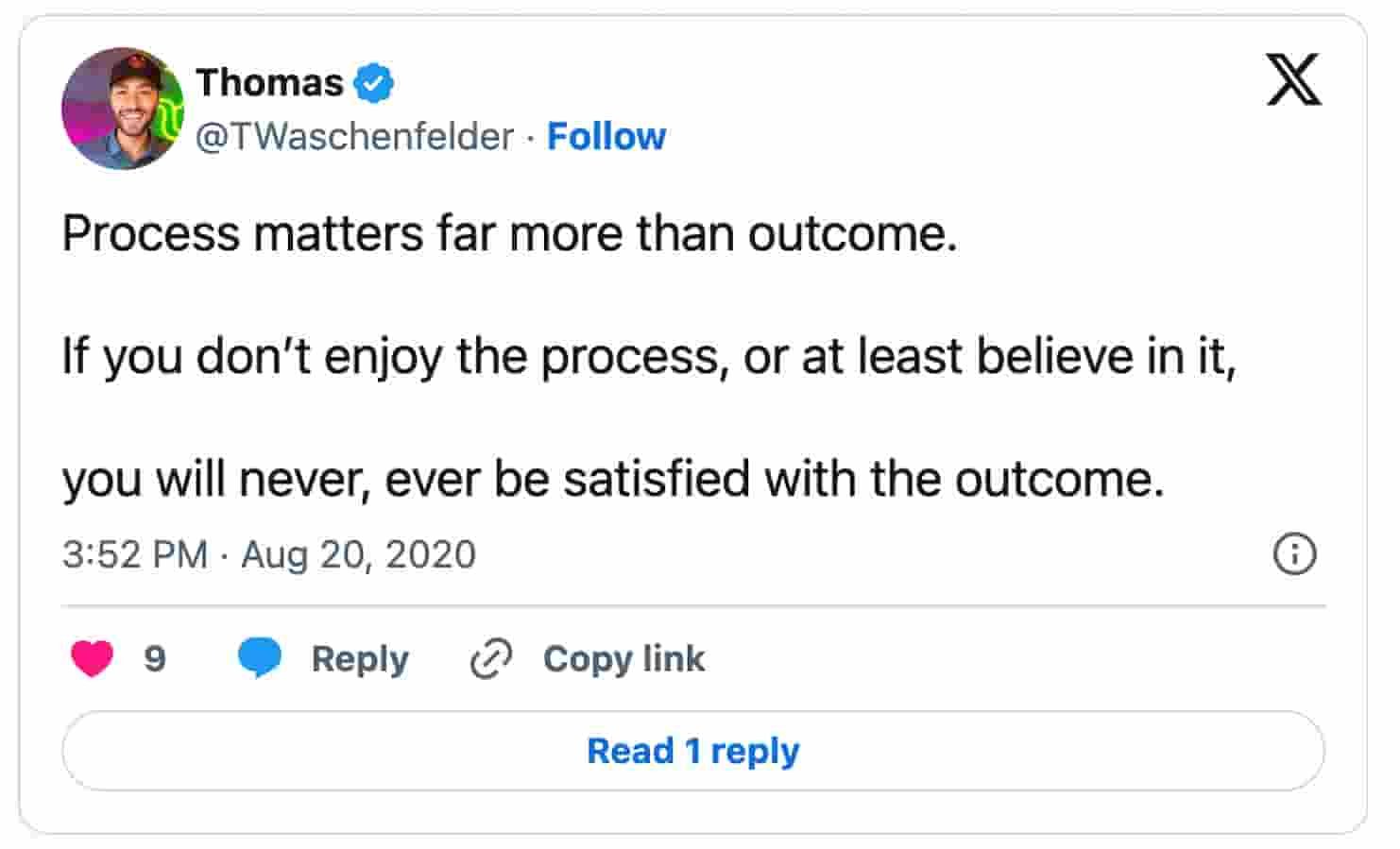Process Thinking: The Journey Is The Destination
“It’s not the destination, it’s the journey.”
If you woke up tomorrow morning and suddenly had everything you wanted, you’d be disappointed.
I know because a small version of this happened to me. One of my goals for the first 6-months of this year was to break 1,000 followers on Twitter.
And overnight, it happened. I sponsored a giveaway after a promoter reached out in a DM with the opportunity. I figured what the hell and gave it a shot (I love tinkering and experimenting).
When I woke up, I was stunned to see I had jumped from about 630 followers to over 1,500.
My initial reaction was regret and then disappointment.
I reached out to the promoter and stopped it almost as soon as it started. I felt horrible like I had been cheated out of something.
This sounds trivial (and maybe it is), but I put a lot of work into my Twitter account.
I curate my feed. I research content. I spend time formatting and trying to optimize my approach. Why? Because Twitter is an unbelievable place to earn impressions, build an audience, and then a business.
And yet, when I woke up and had hit my goal seemingly without any effort from me, it felt all wrong. I was gifted an outcome I didn’t do any work for. I was robbed of the process and handed the result.
Here’s what I learned:
Process matters far more than the outcome. If you don’t enjoy the process, or at least believe in it, you will never, ever be satisfied with the result.
Process Vs. Outcome Thinking
Outcome thinking is being obsessed with the result you are trying to achieve.
Process thinking is about being obsessive about the processes you are using to try and achieve your result.
Process thinking does three things:
It changes who you are.
It lets you replicate the result you want.
It allows you to pursue other opportunities if it makes sense.
Here's an example - say you're trying to make $100,000, and you're obsessed with that outcome.
The first question you have to ask is, why? Are you looking to buy something that costs exactly $100,000? Or would you be better off with $1,000,000? How do you know that $100,000 is really what you want?
Say you go out, buy a lottery ticket, scratch that sucker, and win $100,000 (nice job!) - now what? You haven't learned or improved, and you probably can't repeat what you did to get the same outcome.
Process Changes Who You Are.
Now imagine, instead of winning the lottery, you build an online business that does $100,000 in profit per year. It could be a blog, a Shopify store, a piece of software - whatever.
And throughout that process, you learn almost everything there is to know about your particular niche business. You make all the mistakes. You bleed through all the failures. You learn all the lessons. And come out on the other side as someone who knows what they're doing.
The process has changed who you are!
Through failure, feedback, iteration, and improvement, you' in a far better position now than if you just won $100,000 in the lottery.
“If you can’t describe what you are doing as a process, you don’t know what you are doing.”
Process Thinking Lets You Replicate the Result.
Process thinking also lets you repeat what’s worked for you in the past.
Say you decide you want more than $100,000 after you make it. You have your eye on a beautiful home on the coast and need $300,000 for the down payment.
Great! You know how to make $100,000 and can iterate on that process to make $300,000.
Understanding the process lets you replicate the result.
Process Thinking Keeps You Open To Other Opportunities.
The other advantage of process thinking is that it keeps you open to alternative paths.
You could be working on one process when another opportunity reveals itself with an even better outcome. If you are outcome thinking, you may rip right by that opportunity because it’s not exactly what you’re looking for.
But with process thinking, you are willing and able to pivot your path if it makes sense to do so. Many inventions came into existence this way. The inventor was looking for something else when they stumbled upon the invention they’re known for.
Naval Ravikant on becoming someone who makes money.
The millionaire Naval Ravikant wants you to focus on process over outcome.
He doesn’t want you to be rich.
He wants you to become someone who knows how to get rich.
That way, you don’t have to rely on luck to make money. You are someone who understands the process and can execute it over and over again.
Here’s what Ravikant writes on this blog, How To Get Rich:
A lot of people think making money is about luck. It’s not. It’s about becoming the kind of person that makes money. I like to think that if I lost all my money and if you drop me on a random street in any English-speaking country, within 5, 10 years I’d be wealthy again. Because it’s a skill set that I’ve developed and I think anyone can develop.
In 1,000 parallel universes, you want to be wealthy in 999 of them. You don’t want to be wealthy in the 50 of them where you got lucky. We want to factor luck out of it.
Learning the process of wealth creation changes you into someone who makes money. If you are outcome-oriented, you’ll miss all the lessons along that facilitate this change.
Scott Adams On Systems Over Goals.
Scott Adams found himself sitting next to a serial employee turned CEO on a flight to California.
The CEO told him the secret to his success: as soon as he got a new job, he immediately started looking for a better one. The trick was always to be looking for a better deal. Using this process, he moved from a better job to a better job to the C-suite.
Here’s what Adams learned, in his own words from his book, How To Fail At Almost Everything and Still Win Big:
Your job is not your job; your job is to find a better job. This was my first exposure to the idea that one should have a system instead of a goal. The system was to continually look for better options… for him the entire world was his next potential job.
That’s the power of process over outcome.
James Clear On The Problems Of Goal-Setting.
Writer James Clear has a great blog post on why you should forget about goals. He lists four reasons why goal-setting is problematic:
Winners and losers have the same goals.
Achieving a goal is only a momentary change.
Goals restrict your happiness.
Goals are at odds with long-term progress.
Process thinking eliminates these issues.
While winners and losers have the same goals, you can guarantee they don’t have the same processes. The winner is getting feedback, iterating, and improving the process. The loser is standing stunned and wondering why they aren’t reaching their outcome.
Process thinkers are changed by the process permanently. Goal achievers have a fleeting moment of victory before they identify their next goal.
Outcome thinkers are only happy (for a few moments) when they achieve their outcome. Process thinkers, though, can enjoy the journey even if they never reach their destination.
Finally, achieving a goal signifies an end-point to development. Process thinkers, though, understand there is always something more to learn.
Build Processes, Don’t Seek Outcomes.
If you want to lose weight, don’t pick a number and try to get there (outcome). Become someone who exercises and eats real food every day (process).
If you want to make money, don’t buy a lottery ticket with the hopes of winning $100,000 (outcome). Become someone who is continuously looking for asymmetric investment opportunities and executing (process).
If you want to run a marathon, don’t step out the door and try to run 26 miles (outcome). Become someone who runs five times a week and slowly increase your distance every day for three months (process).
Build processes, don’t seek outcomes.
Start now!
If You Want More Ideas Like This, Subscribe To My Free Newsletter:
SOURCES
Adams, Scott. How to Fail at Almost Everything and Still Win Big: Kind of the Story of My Life. Portfolio/Penguin, 2014.
James Clear’s Blog: Forget About Setting Goals. Focus on This Instead.
Naval Ravikant’s Blog - How To Get Rich (All Episodes)






